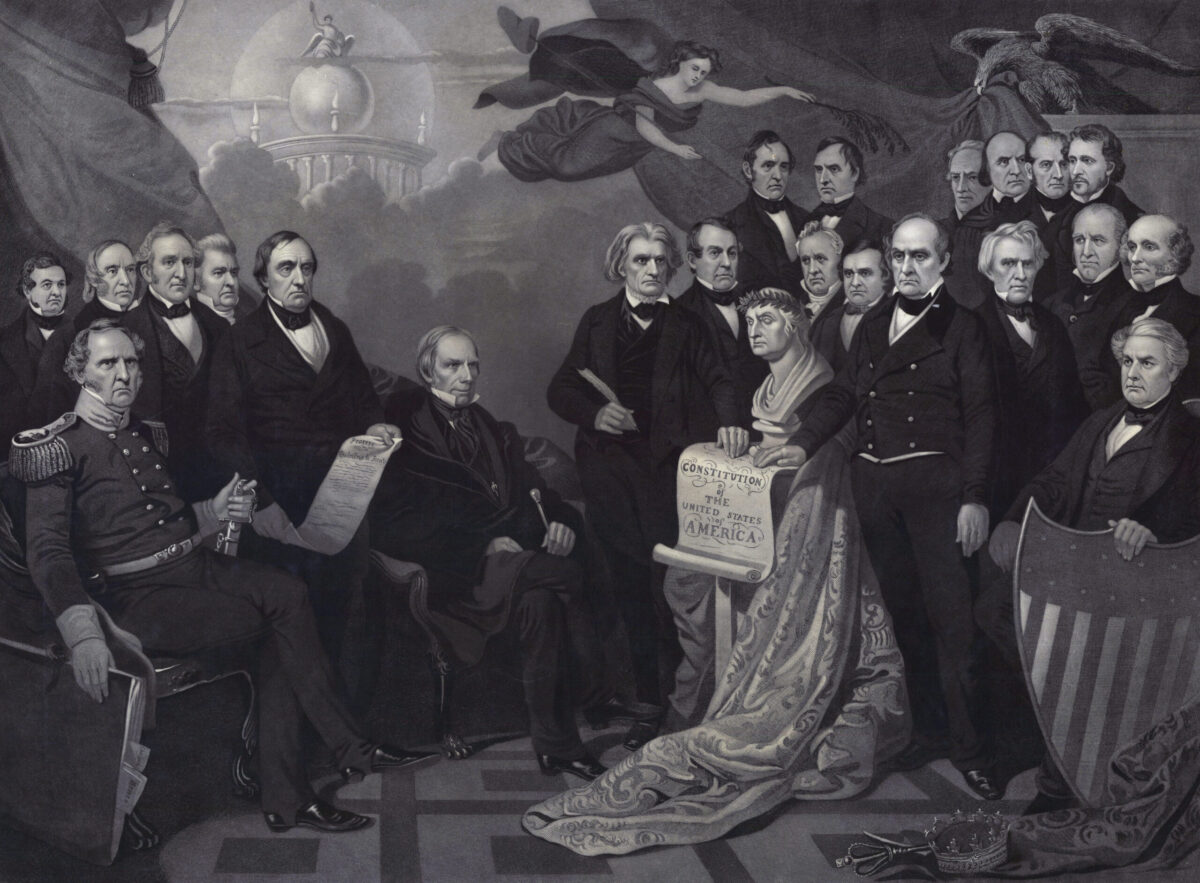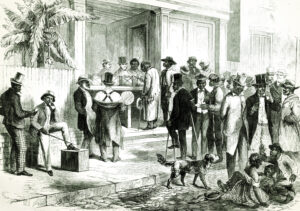As 1819 was becoming 1820, William King should have been celebrating. After a 35-year struggle to cleave from Massachusetts, the District of Maine, King’s home turf, was about to become a state. One of Maine’s richest shipbuilders—he was known as “the Sultan of Bath” in that center of shipwrighting—King, 50, had played so instrumental a role in bringing about this profound change that it was widely thought he would be the new state’s first governor. King had just fathered his first son and second child, born on Christmas. The baby and his mother, Ann, were healthy. However, rather than feeling jubilant King was awash in incredulity. Inexplicably, far to the south in Washington, DC, Congress had embroiled Maine’s statehood bill in the fight to restrict slavery in states joining the Union.
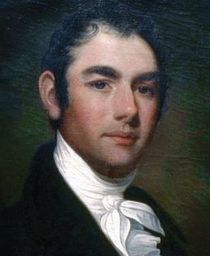
Early in December 1819, members of the Massachusetts congressional delegation representing Maine had submitted the district’s petition for statehood. From the delegates’ perspective—and King’s—approval of the request was a forgone conclusion. Maine’s movers and shakers had persuaded voters and the leadership of Massachusetts to endorse the move. But letters from Maine delegates on Capitol Hill were telling King another story. Speaker of the U.S. House of Representatives Henry Clay (Democratic-Republican, Kentucky) had declared that Maine would not gain statehood if federal legislators insisted on restricting slavery in Missouri, a territory also petitioning to join the Union. Five of the seven men in Maine’s delegation were willing to pass up statehood for the district rather than see slavery expanded. King did not condone slavery, but it had taken 35 years to get Maine to the cusp of statehood and he was not going to let politics keep that from happening.
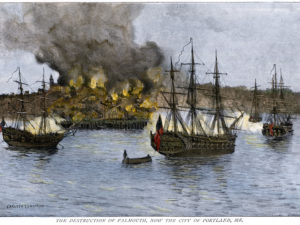
Maine’s long march to statehood had begun in earnest in 1785, when Peleg Wadsworth, 37, owner of a store in what is now Portland, led neighbors in a campaign to end what they all saw as “enslavement” by Massachusetts, which did not even share a border with Maine—New Hampshire separates them—but nonetheless retained a firm grip. Maine separatists had a considerable list of grievances echoing those for which the North American colonies had flayed England—in particular, the complaint that Massachusetts unfairly taxed Mainers, who were underrepresented in the statehouse in Boston.
This bitterness traced to the 1600s and the clouds enveloping land titles in New England. This was especially true in the District of Maine, where competing claims to territory were common. According to Pulitzer Prize-winning historian and Maine native Alan Taylor in his book, Liberty Men and Great Proprietors: The Revolutionary Settlement on the Maine Frontier 1760-1820, land title confusion arose, in part, from “vague and overlapping patents” drafted by lawyers in Britain with no knowledge of the region. Another factor was the phenomenon of Native Americans who had no tradition of “exclusive, private, hereditary property in land” selling the same parcels over and over to new buyers.
By the late 1670s, the colonial government in Boston had consolidated power over Maine and its small, disorganized population, as well as over New Hampshire. In 1679, Britain made New Hampshire a royal province with its own governor. Maine got no such reprieve. In 1691, when the crown renewed New Hampshire’s provincial charter, a pact between Boston and Britain sealed Maine’s fate as part of Massachusetts. Through the mid-1700s, Maine became a shuttlecock in the competition between France and England that culminated in the Seven Years’ War. During the American Revolution, the British attacked, burned, and destroyed Falmouth, an important Maine port.
The signing of the 1783 Treaty of Paris ending the Revolution meant that the District of Maine finally enjoyed peace. Its populace began to grow as the region’s expanses of land and abundant opportunity attracted southern New Englanders. Some newcomers—powerful, wealthy men who had strong economic, social, and political ties to Boston—were known as “great proprietors.” Others were former militia members or enlisted men trying to survive. All had fought for independence, but each demographic had a different outlook. Those differences would fire 35 years of debate over statehood for Maine.
Hardscrabble families moving to Maine held that the Revolution had nullified titles to land that had been owned by or granted to individuals by the British Crown; they figured to move onto such parcels and claim them as their own as compensation for wartime service.
This outlook collided with that of the great proprietors, like Henry Knox, formerly one of George Washington’s generals. Knox’s in-laws owned vast tracts in Maine. He and his fellow proprietors believed the Revolution had been fought to keep large property holdings intact for families such as his wife’s people, and to benefit those, like himself, who had risen to the top of society, Taylor said in an interview. Through their deep connections and with their resources, these players reasserted ownership of or purchased land to which newcomers laid claim.
Conflicts over land ensued, sometimes progressing into violence. Frequently, the great proprietors, flexing their connections to Boston, maintained the upper hand, fueling resentment against Massachusetts.
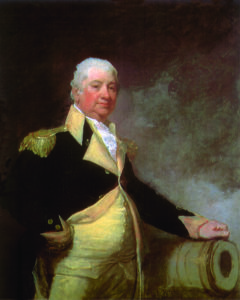
“If it were left up to these people in the interior towns who were fighting with the great proprietors, Maine would have become a state pretty quickly,” Taylor said. However, power in Maine concentrated in towns along its coast—the municipalities with the highest populations, the most political clout, and a dependency on trade with Massachusetts.
But Peleg Wadsworth, who had served as a brigadier general in the Continental Army, joined fellow coastal townspeople chafing at Maine’s subservience to the Bay State.
Besides seeking to relieve Maine of unfair taxes and eliminate underrepresentation, Wadsworth and company wanted power of their own, seeking to be “the ‘big men’ in a new state without oversight from Boston elites,” said Liam Riordan, a history professor at the University of Maine at Orono. Wadsworth and his allies belonged to the Federalist Party that dominated Massachusetts politics, but the Boston government had no desire to share power with Mainers.
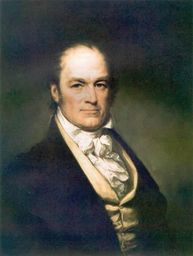
by Treasury Secretary William Crawford, whose influence was key to revising that law.(Picture Art Collection/Alamy Stock Photo)
To run its own show, the Wadsworth faction had to break away. This meant organizing coastal separatists and hinterlanders equally eager for statehood into an alliance strong enough to persuade a diffident stratum of Maine residents to embrace the cause. “Clearly a more persistent group never lived than the men who championed the cause of separation between 1785 and 1797,” wrote historian Ronald Banks in Maine Becomes a State: The Movement to Separate Maine from Massachusetts, 1785-1820. “Rebuffed time and again, they refused to concede defeat.”
Between 1785 and 1794, separatists convened five times, interrupting their agitation only during the creation and ratification of the U.S. Constitution and Shays’s Rebellion but failing to gain enough voter support. The main impediment was the 1789 U.S. Coasting Law. That law required merchant vessels sailing the Atlantic seaboard, outbound and inbound from their home ports, to stop and pay a fee to states that did not border a voyage’s point of origination. Since Maine was part of Massachusetts, ships based there paid no Coasting Law fees until they had gotten all the way to New Jersey. Savings in money and time resulting from this federal requirement discouraged Maine coastal towns from jeopardizing ties to Massachusetts. Finally, Wadsworth and company threw in the towel.
The growth of Thomas Jefferson’s Democratic-Republican Party as the 18th century was ending revived debate in Maine about breaking free of Boston. As the Democratic-Republicans gained power, Maine Federalists who had supported separation about-faced. If Maine stayed in Massachusetts, Maine Federalists could ally with Federalists in Boston to hold onto power, these partisans reasoned. Democratic-Republicans in Maine, led by William King, favored separation. Boston-based Federalists saw utility in letting Maine go its own way, however, and allowed the district to vote repeatedly for separation. Boston Federalists befriended the ambitious and powerful King, who had bootstrapped himself from sawmill hand to shipping magnate. He had businesses all over the district and had served in the Massachusetts House and Senate. His older half-brother, Rufus King, represented New York in the U.S. Senate.
Between 1800 and 1810, separatists made little headway, in part because of the Embargo Act of 1807, which aimed to stop France and Britain from violating United States neutrality as they fought the Napoleonic Wars, crushed Maine’s economy. The War of 1812 initially sapped separatist energies but after Boston refused to help when British forces occupied Maine’s northeast coast, interest in separating grew. A May 1816 referendum tallied 4,000 votes more for separating than for the status quo—but not enough voters had turned out, invalidating the result. Massachusetts agreed to another vote, to be held that September. For the new vote to be valid, 55.5 percent of the votes had to be in favor of separation.
King and colleagues thought victory assured. Four weeks after the districtwide vote, delegates from all around Maine met to review the returns. Separatists were able to tally more votes than those opposing, but still did not achieve the stipulated 55.5 percent majority.
Shenanigans ensued. Voting returns disappeared. Partisans challenged ballots’ legality on grounds of their having been “incorrectly” or “illegally” returned or returned by unqualified voters. Officials debated the meaning of “majority.” Amid the democratic jangle, a majority that at first seemed elusive took form. Separatists cheered. Anti-separatists were apoplectic. The press caterwauled. Massachusetts politicians so detested the display that they voided the vote. King and allies laid low but swore to carry on. The sultan of Bath knew what had to be done.
Most “no” votes in the September 1816 election had been cast in coastal communities where the Coasting Law dominated all considerations. If Maine was to become a state, King knew, the Coasting Law had to go. Late in October 1818, he traveled to Washington, DC, to confer with brother Rufus, who offered advice and support—and aided William in convincing Treasury Secretary William Crawford, whose department enforced the Coasting Law, to get Congress to revise that statute. In spring 1819, Congress rescinded maritime state-by-state stops and fees.
Again, Mainers asked Massachusetts to allow another districtwide vote on separation. Again, Massachusetts agreed. The July 26, 1819, election saw the largest turnout ever for a separation vote in the district; the proposition passed by 10,000 votes. With stipulations, including a deadline that Congress accept Maine as a state by March 4, 1820, Massachusetts agreed to allow the District of Maine to go its own way. Now a federal bill to grant statehood had to navigate the corridors of Congress.

In February 1819, as the Coasting Law revisions were ripening, Congress was considering a bill to grant the territory of Missouri statehood. Addition to that bill of a clause effectively barring slavery in Missouri—the clause reads, “That the further introduction of slavery or involuntary servitude be prohibited, except for the punishment of crimes, whereof the party shall be duly convicted; and that all children of slaves, born within the said state, after the admission thereof into the Union, shall be free, but may be held to service until the age of twenty-five years.”—triggered heated debate that engulfed the congressional session, loosing threats of civil war and disbanding the Union. The matter was unresolved when Congress adjourned on March 3, 1819. Members reconvened that December to find an unexpected gift for advocates of slavery: Maine’s petition for statehood. To that petition bill, pro-slavery members added a clause that would hinge Maine’s statehood on Missouri’s admission to the Union with slavery unrestricted there. To break the ensuing logjam, Congress engineered a compromise: admit Maine as free and Missouri as slave, allow Arkansas and Oklahoma to permit slavery, and prohibit slavery permanently north of latitude 36 degrees and 30 minutes in the unorganized territory of the Louisiana Purchase.
Mainers were outraged. The District of Maine, as part of Massachusetts, had prohibited slavery since 1783, when a series of court cases in Boston deemed the practice illegal in the state.
Even while Massachusetts was accepting bondage, Mainers had owned very few slaves. And while Maine was never a hotbed of abolition—its first anti-slavery body didn’t form until 1833—most residents scorned slavery on moral grounds. The district’s constitution barred slavery and enfranchised African-American men.
With the coupling of Maine statehood to the question of restricting or expanding slavery’s domain writ large, the seven members of the Massachusetts congressional delegation who represented Maine voters—and who did not support slavery—faced an epic quandary: vote against expansion of slavery into Missouri and kill Maine’s chance at statehood or vote for Maine statehood and allow slavery to expand.
“Maine statehood was supposed to be a foregone conclusion—the hard work was supposed to be getting the votes in Maine to break away and convincing Massachusetts’ legislature. [They] did all that,” said Matthew Mason, history professor at Brigham Young University in Provo, Utah. “Congress was supposed to be a formality. Turns out not to be, and so that creates a sense of crisis and competing priorities.”
Mainers at home and in Washington, DC, split sharply on what to do, Mason said. Newspapers in Maine and around the country vociferously staked out positions on either side of the issue, as did the seven Maine members of the Massachusetts House delegation. According to Mason, foes of compromise, willing to restrict slavery even at the cost of Maine’s statehood, framed the argument as a simple moral question: Are you in favor of slavery or against slavery?
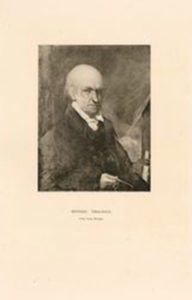
Judge George Thacher, a member of Maine’s constitutional convention, wrote to John Holmes, one of the seven Maine men in Congress and an architect of the compromise, that the delegation should “suffer Martyrdom in the cause of liberty, rather than yield an inch in favor of slavery.” The Portland Gazette said Maine would do better to forgo statehood “than bear up so wicked a freight as the slavery of Missouri.”
But would-be compromisers rejected binary morality, Mason said. They saw compromise as a matter of politics. Constitutionally, Congress could not prohibit slavery in new states because new states entered the Union as equals of existing states, they argued; to dictate whether a state could or could not allow slavery would be to trample that state’s sovereignty. The pro-compromise contingent disdained the separatists’ moralizing, declaring the real concern to be that letting slavery expand would boost the South’s clout until it eclipsed the North’s.
Until that point, grants of statehood had been focusing on the goal of balancing power between slave states and free states. The Maine-Missouri fight became a contest between North and South to advance each region’s hegemony at the other’s expense.
Maine delegates sought William King’s advice. At first, King supported the view that Maine should not ride into statehood on the backs of enslaved persons. He asked half-brother Rufus, a leader among congressional abolitionists, to do whatever he could to extricate Maine from this disaster, but nothing could be done. King began making contingency plans, including discussion of Maine temporarily reorganizing itself as an independent republic, pending a future stab at admission. King lobbied Boston to extend the March 4, 1820, deadline for obtaining statehood, which brought about a two-year extension on admission to the Union.
These arrangements could have facilitated withdrawal of the statehood petition, and some argued for that. But King and other leaders of the Maine Democratic-Republican party were done waiting. King’s support for rejecting statehood to avoid expanding slavery evaporated, despite the break that this shift threatened with his brother. Obtaining statehood by taking slavery’s side was distasteful and unfortunate, said King and the supporters of compromise, but after such a long, hard fight, there would be no pulling back. King urged Maine’s seven delegates to vote for the compromise. Five voted against.
Still, the Missouri Compromise passed, Maine achieved statehood, and the United States of America began a torturous trek toward secession by the Southern states and civil war.
This story appeared in the December 2020 issue of American History.

